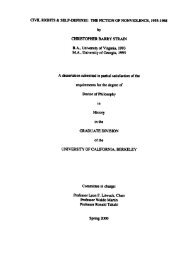Negro Digest - Freedom Archives
Negro Digest - Freedom Archives
Negro Digest - Freedom Archives
You also want an ePaper? Increase the reach of your titles
YUMPU automatically turns print PDFs into web optimized ePapers that Google loves.
come to accept the judgment . Consequently,<br />
they fail to drive themselves<br />
as industriously as they<br />
would in integrated institutions ;<br />
and, too frequently, they protest<br />
against the teachers who demand<br />
college-level work from them . Second,<br />
because they lack first-hand<br />
knowledge of integrated colleges,<br />
they assume that each weakness<br />
which they observe must be unique<br />
to predominantly <strong>Negro</strong> colleges<br />
and must be further evidence of<br />
the inferiority of such institutions .<br />
Like <strong>Negro</strong> teachers, they want<br />
to be part of an institution which<br />
will afford the opportunity to develop<br />
their talents and the prestige<br />
merited by their achievements .<br />
Let us, therefore, dream of the<br />
ideal institution-one which will<br />
give growth to <strong>Negro</strong> teachers and<br />
students alike . It is, I repeat, one<br />
which can be developed within the<br />
current framework of higher education-if<br />
it is to be developed<br />
at all .<br />
.:~~> _ -_<br />
ENDOWMENT<br />
A university must have money .<br />
Good teachers and good administrators-whether<br />
white or blackgo<br />
where salaries will buy all the<br />
necessities and, hopefully, some of<br />
the luxuries . Money is needed for<br />
classroom buildings, dormitories,<br />
staff, equipment, and supplies .<br />
Predominantly <strong>Negro</strong> colleges<br />
NEGRO UIGEST March 1968<br />
have lacked money . They have depended<br />
upon state legislators,<br />
churches, generous patrons, alumni,<br />
and students . Except in California,<br />
legislators spend money for<br />
education as grudgingly as a temperance<br />
worker gives alcoholics<br />
money for liquor . Generally, one<br />
state-supported university is favored<br />
. The rest beg. The least successful<br />
beggars have been the<br />
predominantly <strong>Negro</strong> colleges,<br />
which have lacked alumni who,<br />
seated in Southern legislatures,<br />
might trade votes for dollars . More<br />
limited in funds, churches frequently<br />
have doled their allotments<br />
with the prayer that sacrifice and<br />
dedication might substitute for<br />
cash . Donors-both individuals<br />
and foundations-have been generous<br />
at times . But, planning a<br />
black university, one cannot afford<br />
to forget that the majority of philanthropic<br />
supporters of <strong>Negro</strong>es'<br />
higher education are white . <strong>Negro</strong><br />
alumni have contributed ; but, deficient<br />
in both number and wealth,<br />
they generally have been unable to<br />
provide more than a few scholarships<br />
and some spending change .<br />
Tuition has been an important<br />
source of revenue, but it is a troublesome<br />
source . Raise tuition too<br />
high ; fewer students attend . Increase<br />
the number of students ; additional<br />
money is needed for<br />
teachers, equipment, supplies, and<br />
facilities . Furthermore, the quality<br />
of the student too frequently is<br />
lowered when additional quantity<br />
is sought .<br />
1 7
















